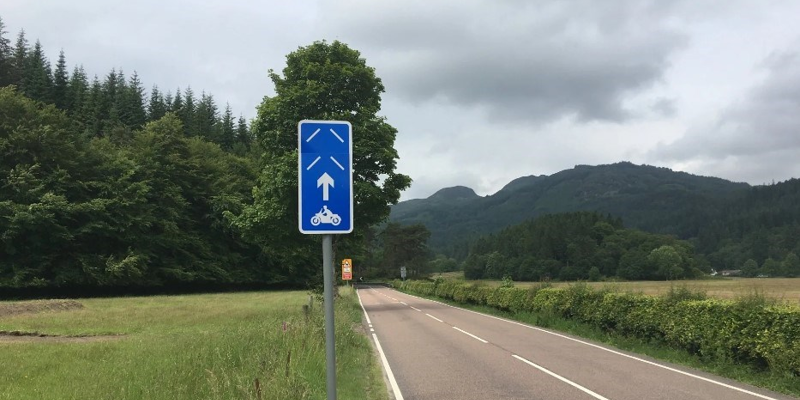Motorcycle safety drive wins prestigious award
A motorcycle safety project in Scotland has been awarded a prestigious road safety award by a panel of international experts.
Project PRIME has been given a Prince Michael International Road Safety Award, which is presented to organisations in recognition of their outstanding contribution to improving road safety.
Transport Scotland worked with the Road Safety Trust, BEAR Scotland and globally recognised expert Professor Alex Stedmon to create 22 trial sites across Scotland where new road markings were installed to improve the riding behaviour of motorcyclists taking left hand bends.
Video footage of over 32,000 motorcycles using the markings was manually assessed and led to:
- A significant reduction in speed.
- A significant improvement in road position both on the approach and apex of the bend.
- A significant improvement in braking behaviour.
- No motorcycle injury collisions at any of the previously identified accident cluster sites where PRIME markings have been deployed.
Project PRIME was also awarded both the Road Safety Scheme of the Year Award and the Judges Special Merit Award at the UK Transport Awards in October.

Minister for Transport Fiona Hyslop said:
“I am delighted to see Project PRIME recognised with a prestigious Prince Michael International Road Safety Award.
“Project PRIME has been a real triumph for road safety, demonstrating what happens when latest academic theory is supported by real world application – all made possible thanks to Scottish engineering and a strong partnership approach.
“This award not only underlines the success of the project, but also gives international recognition to the hard work of all the partners involved.
“The Scottish Government strongly believes that one death on our roads is one too many and remains absolutely committed to working towards having the best road safety performance in the world by 2030 and an ambitious long term goal where no one is seriously injured or killed on our roads by 2050.”
Professor Alex Stedmon said:
"It is an incredible honour to receive this award for Project PRIME, especially with its focus on motorcyclists who are one of the most vulnerable types of road user.
"This work has provided a unique opportunity to use fundamental principles of Applied Psychology in real-world trials with many tens of thousands of riders. The work also underpins Scotland’s Road Safety Framework to 2030 and the wider Safe System approach to road safety.
"Throughout Project PRIME we have involved motorcyclists in the development of this casualty reduction initiative, so that the road markings are something they will accept and use. It has been developed for motorcyclists by motorcyclists.
"As a psychologist and also a keen motorcyclist, I am very proud to have led the research on this work. While solution might appear simple, the science behind it is complex. However, it would not have been possible without the support and commitment of the Road Safety Trust, Transport Scotland, BEAR Scotland and Open Road Simulation.
"Receiving the Prince Michael International Road Safety Award will elevate the importance of this work and the significant social and economic impact of Project PRIME around the world."
Ruth Purdie OBE, chief executive of The Road Safety Trust, said:
“The PRIME project represents a new and innovative approach to motorcycle casualty reduction. With data from tens of thousands of motorcyclists, the results show that PRIMEs have a significant positive effect on rider behaviour.
“The Road Safety Trust is absolutely delighted that this project has been presented with a prestigious Prince Michael International Road Safety Award, recognition for its potential to help keep riders safe - and reduce collisions and casualties - across the globe.”
Ian Stewart from BEAR Scotland said:
“I am proud of BEAR Scotland’s role as a key partner in Project PRIME. This award is clear recognition of our commitment towards improving road safety for all road users, while also commending the hard work of everyone involved in the project.
“BEAR Scotland Road Safety Engineers have been involved with this real-world research project from its conception and their expertise enabled it to be carried out on Scottish roads. We supported the project by delivering the initial feasibility report, identifying potential trial sites, and developing and installing new road signs and road markings.
“This work has the potential to be a low cost, highly beneficial road safety improvement scheme that will help reduce motorcycle accidents on our roads for years to come. It is anticipated that the trials will be expanded further in the next few years and potentially be rolled out across the wider trunk road network and local road network in Scotland.”